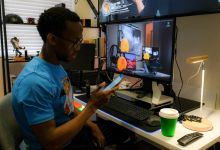Tech Expert: Ways to Protect Your Student From Hackers During Online Learning
How you can protect your computer and how school districts are protecting your information.
With so many kids doing school online, there’s a new concern that parents may not be thinking of… computer security. Not only at home, but with the school district having your child’s personal, sensitive information.
Just imagine your 9-year-old child, who barely knows how to use a computer, much less email. They open an email that looks to be from a teacher with a link inside that says ‘click to get homework’. They click it and suddenly your computer is infected with a virus. It’s a hypothetical situation but could happen and destroy any pictures or documents you have on that computer.
Randy Watkins is the chief technology officer at a company called CRITICALSTART that helps businesses and organizations detect and defend themselves from cyber threats. “With schools having so much attention right now with school starting back up. They’re on all online platforms and they’re collecting more information about users, attackers see them as having more valuable information that they’ll pay a higher ransom for so they are absolutely targeting schools with ransomware.”
He says there are several things we can do at home to protect ourselves and our kids. First, make sure your computer’s operating system is properly patched or updated. “Organizations and software companies like Microsoft, they release security patches pretty regularly.’
Maintain any antivirus software already installed. “That will help prevent some of the ransomware from executing on your computer.”
And teach your kids about the culture of computer security. “Teach them to only look at reputable sources on the internet. Don’t open emails they aren’t expecting to open. Don’t open attachments from those emails if they haven’t verified that they should have an attachment.”
School districts also have a responsibility to protect your child’s information. We asked several Tampa Bay area school districts how they are doing that.
Pinellas County: “The district has many safety systems in place to protect computers from being hacked including anti-virus software to a top-rated firewall. We lock down the student computers meaning students don’t have administrative rights. They can’t load any applications or software to the device.
The district loads only approved software and the applications needed. Students are allowed to receive and send only internal emails such as to their teachers. They cannot email other students. The district has a TIS Security Council that meets twice a month to review security manual, security protocols, vulnerability and penetration tests, and train staff on cybersecurity.”
Hillsborough County: “As for our own security systems, our district deploys a managed Fortinet nextgen firewall service with content filtering for the devices.
Also when the device is taken home, we currently have Lightspeed Relay filtering deployed for content filtering. We deploy Symantec EndPoint Protection on all Windows devices district-wide. Our software allows for application control as well as other controls.”
Featured in WTSP Tampa Bay News | August 27, 2020






